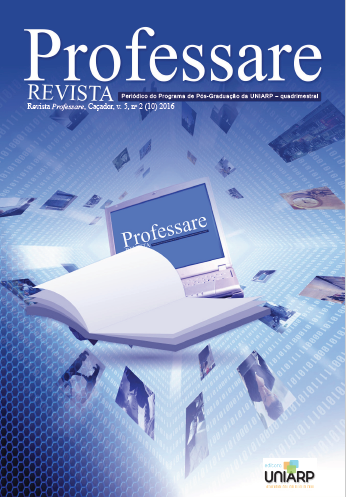“A GENTE TÁ LOUCA PRA SE FORMAR!”: REPRESENTAÇÕES SOBRE O ESTÁGIO E IMPLICAÇÕES PARA A FORMAÇÃO INICIAL DE PROFESSORES DE LÍNGUA MATERNA
DOI:
https://doi.org/10.33362/professare.v5i2.883Resumo
Neste trabalho identificamos e analisamos as representações de professores em formação inicial sobre o estágio de regência e problematizamos os seus efeitos formativos. Para isso, baseados nas orientações teórico-metodológicas do Interacionismo Sociodiscursivo (BRONCKART, 2009),
analisamos como oitos estagiárias da
disciplina de Estágio em Ensino de Língua Portuguesa do curso de Letras da Universidade Federal do Ceará representam, linguística e enunciativamente, o estágio de regência. Em nossa análise, desenvolvida na área da Linguística Aplicada, identificamos as modalizações apreciativas mobilizadas pelo grupo em dois Grupos Focais (doravante, GFs) realizados no início e no final da disciplina. Na análise, constatamos que as estagiárias representam o estágio de regência, tanto antes quanto durante a disciplina, a) como aprendizagem da profissão e como aplicação da teoria e de técnicas de ensino, b) como avaliação da prática, e c) como atividade final para conclusão do curso. Sendo assim, as estagiárias, durante a disciplina, não ressignificaram suas representações, que estão relacionadas, sobretudo, a preocupações burocráticas, como o cumprimento da carga horária da disciplina.
Palavras-chave: Representações. Estágio. Modalizações Apreciativas.
“We are crazy to finish the course!”: representations about the student teaching practicum and implications for initial training of teachers of mother tongue
ABSTRACT
Through this research we intended to identify the representation achievements of eight student teachers in regard to Portuguese Teaching Practicum at UFC Language and Arts major. Based upon a discursive view of representations, we sought to delineate, from the positions taken by the student teachers, what the object of representation “student teaching practicum” unfolds in their discourse during the interaction with their peers in focus groups of the meanings and values that they attach to student teaching practicum, before and during the course. To do that, we relied upon the theoretical and methodological frameworks of socio-discursive interactionism (BRONCKART, 2009). As data collection procedures we adopted two focus groups (FG), language-action situations by which the student-teachers engaged and mobilized their representations during the practicum experience. Regarding the analysis, we have adopted the modalizations from which the actions taken by the group were identified and in face of the activities required for the course. Using a qualitative-interpretive lens, we found that the student teachers represent the practicum experience as: a) the learning of the profession and as the application of theory and of teaching techniques via practice, b) as feedback (assessment) of their practice, and, c) as the final requirement for the undergraduate course completion or as a last step towards certification. Thus, the student teachers, during the course, did not reformulate the representations. Based on these representations, we can affirm that the student teachers participate in the activities of the course only to fulfill bureaucratic aspects without significantly reflecting on their teaching actions, for example.
Keywords: Representations. Student teaching practicum. Modalizations.
Downloads
Publicado
Como Citar
Edição
Seção
Licença
Autores que publicam nesta revista concordam com os seguintes termos:- Autores mantém os direitos autorais e concedem à Revista o direito de primeira publicação, com o trabalho simultaneamente licenciado sob a Licença Creative Commons Attribution que permite o compartilhamento do trabalho com reconhecimento da autoria e publicação inicial nesta Revista.
- Autores têm autorização para assumir contratos adicionais separadamente, para distribuição não-exclusiva da versão do trabalho publicada nesta Revista (ex.: publicar em repositório institucional ou como capítulo de livro), com reconhecimento de autoria e publicação inicial nesta Revista.
- Autores têm permissão e são estimulados a publicar e distribuir seu trabalho online (ex.: em repositórios institucionais ou na sua página pessoal) a qualquer ponto antes ou durante o processo editorial, já que isso pode gerar alterações produtivas, bem como aumentar o impacto e a citação do trabalho publicado (Veja O Efeito do Acesso Livre).









